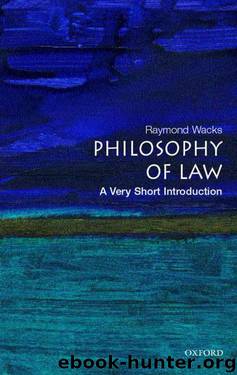Philosophy of law a very short introduction by Raymond Wacks

Author:Raymond Wacks [Wacks, Raymond]
Language: eng
Format: epub, mobi
Tags: Philosophy, History & Surveys, General, Law, Jurisprudence, Law - Philosophy
ISBN: 9780192806918
Publisher: Oxford ; Oxford University Press, 2006.
Published: 2006-07-17T10:18:51.946000+00:00
Chapter 5 Law and society
So far we have been preoccupied with normative legal theory, and its endeavours to explain the concept of law, as it were, from within. That is to say, normative legal theory concentrates on legal doctrine and the relations between rules, concepts, principles, and other constructs employed by courts and lawyers engaged in the actual practice of the law. But there is another approach to legal analysis that attempts to understand the nature of these phenomena by reference to the social conditions in which they function. This sociological approach has exercised a considerable influence, often unacknowledged, on the philosophy of law.
For example, Hart’s insistence that officials accept the rule of recognition ‘from the internal point of view’ and his claim that there should be a ‘critical reflective attitude’ to certain patterns of behaviour as a common standard (see Chapter 2) echo Max Weber’s concept of internal legitimation (see below).
A sociological account of law normally rests on three closely related claims: that law cannot be understood except as a ‘social phenomenon’, that an analysis of legal concepts provides only a partial explanation of ‘law in action’, and that law is merely one form of social control.
Though the genesis of sociological jurisprudence or the sociology of law may be traced back to the trail-blazing writings of Roscoe Pound and Eugen Ehrlich, this chapter focuses on the two giants of social theory—Émile Durkheim and Max Weber – whose impact on jurisprudence has been most profound. I shall also have something to say about the impact of Karl Marx on thinking about law and the legal system, as well as about two leading social theorists, Jürgen Habermas and Michel Foucault, whose writings continue to exert a considerable influence in certain quarters of contemporary legal theory.
Émile Durkheim
Among the central preoccupations of Durkheim (1859–1917) is the question of what holds societies together. Why do they not drift apart? His answer points to the crucial role of law in promoting and maintaining this social cohesion. He shows how, as society advances from religion to secularism, and from collectivism to individualism, law becomes concerned less with punishment than compensation. But punishment performs a significant role in expressing the collective moral attitudes by which social solidarity is preserved.
He distinguishes between what he calls mechanical solidarity and organic solidarity. The former exists in simple, homogeneous societies which have a uniformity of values and lack any significant division of labour. These uncomplicated communities tend to be collective in nature; there is very little individualism. In advanced societies, however, where there is division of labour, a high degree of interdependence exists. There is substantial differentiation, and collectivism is replaced by individualism. These forms of social solidarity are, he argues, reflected in the law: classify the different types of law and you will find the different types of social solidarity to which it corresponds.
Crime, according to Durkheim, is a perfectly normal aspect of social life. Moreover, he provocatively suggests, it is an integral part of all healthy societies. This is
Download
Philosophy of law a very short introduction by Raymond Wacks.mobi
This site does not store any files on its server. We only index and link to content provided by other sites. Please contact the content providers to delete copyright contents if any and email us, we'll remove relevant links or contents immediately.
The Rule of Law by Bingham Tom(1316)
Philosophy of law a very short introduction by Raymond Wacks(1294)
Constitutional Theory by Carl Schmitt(1031)
The Quest for Cosmic Justice by Thomas Sowell(985)
A Matter of Interpretation by Antonin Scalia(935)
Hiding from Humanity: Disgust, Shame, and the Law by Martha C. Nussbaum(880)
The Law by Frederic Bastiat(855)
Philosophy of Law - A Very Short Introduction by Raymond Wacks(847)
Dignity, Rank, and Rights by Jeremy Waldron & Meir Dan-Cohen(797)
Superbia 2 by Bernard Schaffer(796)
The Sovereignty of Human Rights by Macklem Patrick(789)
The Ages of American Law by Grant Gilmore(784)
An Introduction to the Principles of Morals and Legislation by Jeremy Bentham(783)
An Introduction to the Philosophy of Law by Roscoe Pound(779)
Emotional Dynamics of Law and Legal Discourse by Heather Conway John Stannard(770)
The Law by Frédéric Bastiat(751)
Zagrebelsky, Gustavo by La legge e la sua giustizia(724)
Superbia (Book 3) by Schaffer Bernard(715)
Superbia (Book 2) by Schaffer Bernard(708)
